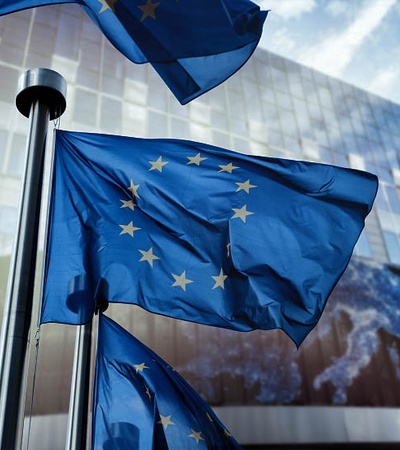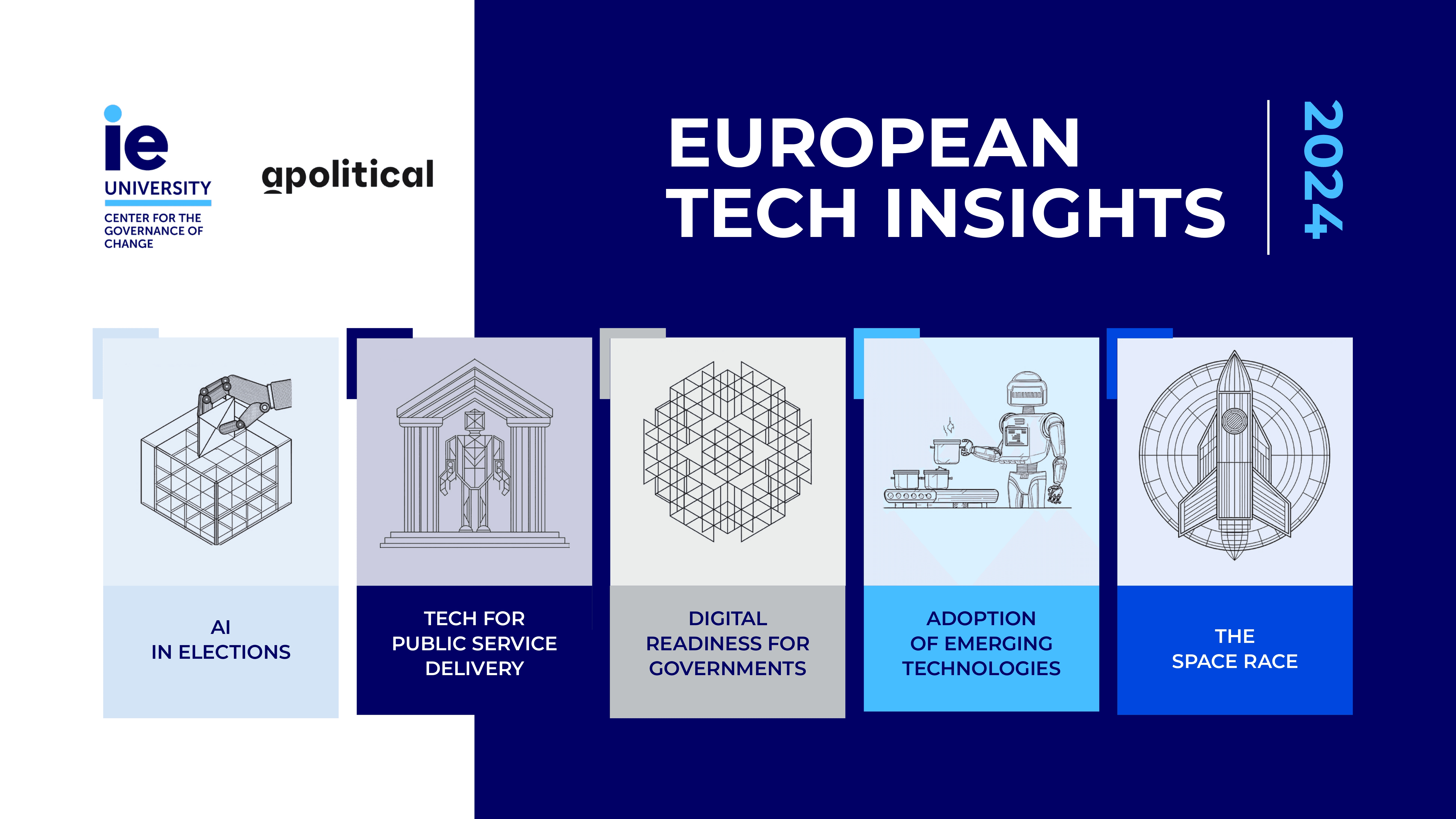Technology is transforming the world around us and this brings a combination of excitement and opportunity, but also challenges to our way of life, labor markets and societies. To tackle the great technological transformation of our time, public and private actors need to understand what is legitimate in the eyes of the citizens and what sort of technological future they may be ready to embrace. Our annual survey, European Tech Insights, explores attitudes towards technological change with the aim of understanding how technology is transforming our lives and how it should be governed.
The 2024 edition of European Tech Insights delves deeper into attitudes towards AI and elections, in the context of a super-electoral year, AI and public services, integration of emerging technologies into daily-life and space tech. This year, the Center for the Governance of Change has partnered with Apolitical, the world’s largest community of public servants, to survey both citizens and a small sample of public servants.
European Tech Insights 2024 reveals that citizen and public servant views on emerging technology show both agreement and differences. Citizens want governments to leverage technology for efficiency while expecting transparency in its deployment. Their stance can be summed up as "yes, as long as core values are respected." This cautious optimism applies to AI in elections, where trust exists alongside concerns about misuse. In healthcare and space exploration, citizens support innovation but emphasize that ethics and inclusivity must guide progress.
SURVEY METHODOLOGY
SURVEY METHODOLOGY
In the general population survey, the Center for the Governance of Change at IE University gathered responses from 3,006 adults spanning 10 countries: Estonia, France, Germany, Italy, the Netherlands, Poland, Romania, Spain, Sweden, and the United Kingdom. The samples maintained a representative balance with regards to age, gender, region and studies.
In the public servants survey, Apolitical initiated a panel among its network members, which includes public servants from over 100 countries. This survey gathered 47 responses from public servants in the same 10 countries as the citizen sample.
key findings
key findings
OPTIMISM FOR AI CLASHES WITH PUBLIC CONCERNS
More than a third (34%) of young Europeans would trust an AI app to vote for them, yet 40% of Europeans and 74% of public servants harbor concerns about potential misuse of AI during elections, like disinformation and voter manipulation. Furthermore, almost a third of Europeans (31%) believe that AI has influenced their voting behavior.
EUROPEANS BACK AI FOR PUBLIC EFFICIENCY BUT DEMAND PRIOR APPROVAL
Europeans favor the deployment of AI for public service delivery but overwhelmingly (86%) want governments to get prior approval from them. They endorse using AI for matching jobs for the unemployed (79% in favor) or processing tax returns (65% in favor) but draw the line at sensitive applications such as parole (64% against). Public servants tend to support broader AI deployment, sometimes even without human supervision.
CITIZENS RATE GOVERNMENT TECH EFFORTS POSITIVELY, YET BELIEVE EUROPE IS LAGGING IN DIGITALIZATION
Citizens approve of the government’s efforts to use technology with a score of 3.23 over 5. Despite this, there’s a widespread perception that Europe is not keeping pace with global digitalization, with two thirds believing it is moving too slowly compared to China and America. While there’s skepticism about government capabilities in cybersecurity (60% believe private companies are better prepared against cyberattacks), a majority of Europeans support the idea of their governments developing their own software rather than using existing ones from tech companies.
EUROPEANS EMBRACE HEALTH INNOVATIONS AND TECH CONVENIENCE
Europeans support the adoption of technologies that enhance healthcare and daily convenience, with 75% in favor of medical devices for remote patient monitoring, and 57% endorsing humanoid robots for household chores. Over a third (36%) would even consider using neurostimulation devices, while nearly half of young Europeans would be open to using ocular devices to record their memories. However, enthusiasm wanes for technologies that involve personal interactions, such as AI companions for romantic relationships.
EUROPEANS BACK CONTINUED FUNDING FOR SPACE RESEARCH
European citizens and public servants both support continued funding for space exploration, with a strong preference for advancing scientific research and discovery—54% of citizens and up to 88% of public servants agree. Regarding the space race, Europeans favor public-private partnerships instead of efforts led solely by governments or companies. Almost half (48%) of Europeans under 35 believe they will see people travel to space in their lifetime.
PREVIOUS EDITIONS
PREVIOUS EDITIONS
European Tech Insights 2023 highlighted a considerable trust in the EU to regulate AI, with Europeans generally open to balancing privacy with security needs. The report also noted a preference for more governmental oversight on AI and automation, emphasizing the ongoing consideration of the impacts of technological progress.
European Tech Insights 2022 was marked the resurgence of a war in Europe and an intense geopolitical context. The 2022 edition examined perceptions on the Ukrainian conflict, technology in democracy, and the role of emerging tech.
European Tech Insights 2021 is composed of two studies: Part I focused on how the pandemic has altered our habits and perceptions with regards to healthcare, work, social networks and the urban space. Part II revealed how Europeans are embracing technologies (from AI to automation) and what are the implications for our democracies and societies.
European Tech Insights 2020 revealed how the onset of the pandemic had a major impact on global attitudes towards data privacy, politcs and the regulation of new technologies.
European Tech Insights 2019 confirmed a shared intuition among researchers: the Fourth Industrial Revolution is producing a growing sense of insecurity and uncertainty among our fellow citizens.
To find out more download our reports above.






